234 Social Media Research Topics & Ideas
- Icon Calendar 18 May 2024
- Icon Page 2646 words
- Icon Clock 12 min read
Social media research encompasses a broad range of different topics that delve into the ever-evolving digital landscape. People investigate the impact of social platforms on society, exploring subjects, such as online identity formation, self-presentation, the psychology of virtual interactions, and others. Additionally, studies examine the influence of social media on politics, activism, and public opinion, uncovering patterns of information dissemination and polarization. Privacy concerns, cyberbullying, and online safety are also explored in-depth, seeking strategies to mitigate the associated risks. In this article, people can find many social media research topics, ideas, and examples.

Hot Social Media Research Topics
- Impacts of Social Media and Internet Algorithms on User Experience
- The Rise of TikTok: A Socio-Cultural Analysis
- Dealing With Cyberbullying: Strategies and Solutions
- Understanding the Phenomenon of Social Media ‘Cancel Culture’
- NFTs and Social Media: The Future of Digital Art?
- Ethical Concerns in the Era of Influencer Marketing
- Social Media’s Role in Accelerating E-Commerce Growth
- Impacts of Internet and Social Media on Journalism and News Reporting
- Understanding the Psychology of Viral Challenges on Social Platforms
- Cryptocurrency and Social Media: The Intersection
- Mitigating Misinformation and ‘Fake News’ on Social Media
- Augmented Reality (AR) in Social Media: A Game Changer?
- Evaluating the Impact of Social Media on Political Campaigns
- Social Media’s Influence on Fashion and Beauty Trends
- Privacy, Safety, and Security Concerns in the Age of Social Networking
- Roles of Free Access and Social Media in Promoting Sustainable Practices
- Implications of Social Media Addiction on Mental Health
- Examining Social Media’s Role in Crisis Communication
- The Power of User-Generated Content in Branding
- Influence of Social Media on Food Culture and Dining Trends
Easy Social Media Research Topics
- Impacts of Online Videos and Social Media on Mental Health
- Influencer Marketing: Efficacy and Ethical Concerns
- Evolution of Privacy Policies Across Social Platforms
- Understanding Virality: What Makes Content Shareable?
- Cyberbullying: Prevalence and Prevention Strategies
- Social Media and Political Polarization: An In-Depth Study
- Role of Social Media in Modern Business Strategies
- Effect of Social Media on Interpersonal Relationships
- Social Platforms as Tools for Social Change
- Navigating Online Hate Speech: A Legal Perspective
- Emerging Trends in Social Media Advertising
- Online Identity Construction and Self-Presentation
- The Psychology of Social Media Addiction
- Social Media’s Role in Crisis Management and Communication
- Sentiment Analysis in Social Media and Its Implications
- Social Media Algorithms: Bias and Implications
- The Phenomenon of Cancel Culture on Social Platforms
- Cybersecurity Threats in the Era of Social Media
- Analyzing Adverse Impacts of Social Media on Consumer Behavior
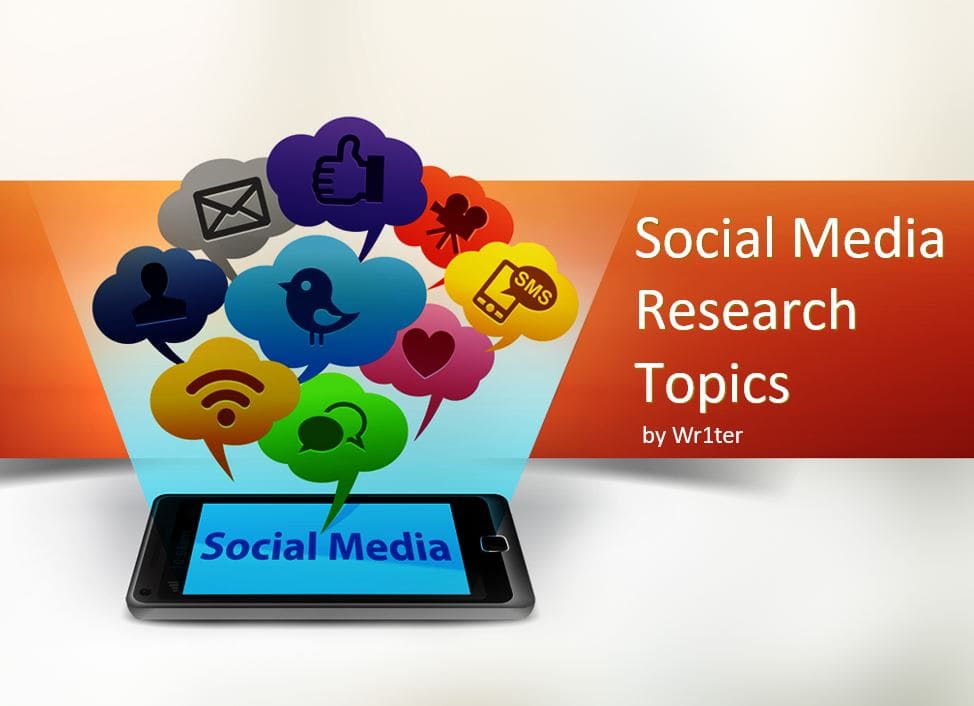
Interesting Social Media Research Topics
- Evaluating the Effects of Social Media on Language and Communication
- Roles of Social Media in Fostering Political Engagement
- Misinformation and Propaganda Spread Through Social Platforms
- Analyzing the Shift From Traditional Media to Social Media
- Dark Patterns in Social Media: Hidden Manipulative Tactics
- Social Media and Digital Activism: Revolutionizing Advocacy
- Augmented Reality (AR) and Its Impact on Social Networking
- Exploring Cybersecurity Issues in Social Media Platforms
- Roles and Effects of Social Media and News in Mental Health Promotion
- Strategies for Effective Social Media Crisis Management
- The Power of Live Streaming for Brands and Influencers
- Using Social Media to Enhance Classroom Learning
- Analyzing the Influence of Memes on Internet Culture
- Impacts of Social Media Algorithms on User Behavior
- Assessing the Correlation Between Social Media and Loneliness
- Geotagging and Its Implications for Personal Privacy
- Social Media and E-commerce: A Cross-Industry Study
- The Ethics of Digital Advertising on Social Platforms
- Understanding the Psychology of Social Media Trolls
- The Cultural Shift Caused by Social Media Localization
Social Media Research Paper Topics for High School
- The Phenomenon of Cyberbullying: Prevention and Strategies
- How Does Social Media Influence Teen Body Image?
- Evaluating the Educational Potential of Social Media Platforms
- Impacts of Social Media on Adolescents’ Self-Esteem
- Roles of Free Connection and Social Media in Modern Political Activism
- Exploring the Concept of ‘Digital Citizenship’ Among Teenagers
- The Ethics of Social Media Privacy: User Rights and Responsibilities
- Social Media Addiction: Understanding Its Causes and Effects
- Influence of Social Media on Modern Communication Styles
- Analyzing Positive Roles of Social Media in Promoting Reading Culture
- Social Media and Mental Health: Correlation or Causation?
- The Role of Social Media in Global Environmental Awareness
- Examining Social Media’s Impact on Real-Life Social Skills
- Social Media Platforms: Tools for Personal Branding or Narcissism?
- Influence of Social Media Trends on Youth Fashion Choices
- Impacts of Social Media on Teenagers’ Sleep Patterns
- Online Safety: The Role of Parents and Schools in Social Media Usage
- How Does Social Media Influence Teenagers’ Views on Relationships?
- Social Media and Empathy: Does Online Interaction Decrease Compassion?
Social Media Research Paper Topics for College Students
- Evaluating the Impact of Social Media on Body Image and Self-Esteem
- The Influence of Social Media on Voting Patterns Among Young Adults
- Social Media as a Valid Tool for Social Change: A Case Study Approach
- Unveiling the Psychology of Social Media Addiction
- Social Media’s Role in Modern Journalism: Opportunities and Challenges
- Privacy Implications of Data Collection on Social Media Platforms
- Cyberbullying in the Age of Social Media: Scope and Solutions
- The Ethical Aspects of Social Media Influencer Marketing
- Roles and Effects of Social Media in Crisis Communication and Management
- Social Media and Its Effects on Interpersonal Communication Skills
- Analyzing Social Media Strategies of Successful Businesses
- Impacts of Internet Use and Social Media on Mental Health Among College Students
- The Roles That Social Media Has in Modern Political Campaigns
- Understanding the Social Media Algorithm: Bias and Implications
- Social Media and Consumer Behavior: The Power of Influencer Marketing
- Fake News, Authors, and Disinformation Spread Through Social Media Platforms
- Exploring Direct Links Between Social Media Use and Academic Performance
- Social Media’s Role in Promoting Sustainable Lifestyle Choices
- Regulation of Hate Speech and Offensive Content on Social Media
- The Power and Peril of Virality in the Age of Social Media
Social Media Research Paper Topics for University
- The Effect That Social Media Has on Global Politics
- The Ethics of Data Mining in Social Media
- Roles of Social Media in Business Marketing Strategies
- Social Media, Internet Use, and Their Impacts on Mental Health: A Systematic Review
- Algorithmic Bias in Social Media Platforms: Causes and Consequences
- The Influence of Colors and Social Media on Consumer Behavior
- Exploring Possible Relationships Between Social Media Use and Academic Performance
- Privacy, Morality, and Security Concerns in the Age of Social Media
- Social Media as a Platform for Digital Activism
- Impacts of Social Media on Interpersonal Communication and Relationships
- Cyberbullying on Social Media: Scope, Impact, and Preventive Measures
- The Role of Social Media in Spreading Health-Related Misinformation
- Analyzing the Effect of Social Media on Journalism Practices
- Understanding the Influence of Social Media on Body Image Perceptions
- Social Media’s Role in Crisis Management: Case Studies
- The Power and Effectiveness of Influencer Marketing on Social Media
- Fake News and Disinformation in the Social Media Age
- Regulatory Approaches to Hate Speech on Social Media Platforms
- The Economic Implications of Social Media: From Startups to Giants
Social Media Research Paper Topics for Masters
- Advanced Algorithms and Their Role in Shaping Social Media Interactions
- Evaluating the Impact of Social Media on Democratic Processes Globally
- The Intersection of Privacy, Data Mining, and Ethics in Social Media
- Quantitative Analysis of Social Media’s Impact on Consumer Buying Behavior
- Cybersecurity Threats in Social Media: Mitigation and Prevention Strategies
- Analyzing the Psychological Implications of Social Media Addiction
- Using Social Media Data to Predict Market Trends: An Econometric Approach
- Role of Social Media in Crisis Management: A Comparative Study
- The Sociolinguistic Impact of Social Media on Communication
- Machine Learning and AI in Social Media: An Examination of Emerging Trends
- Social Media as a Valid Tool for Public Health: Opportunities and Challenges
- Social Media’s Influence on Modern Journalism: A Critical Analysis
- Mapping Social Networks: A Graph Theory Approach
- Evaluating the Efficacy of Social Media Campaigns in Social Change Movements
- Analyzing the Role of Social Media in Corporate Reputation Management
- Data Privacy Laws and Social Media: A Comparative Study
- The Use of Small and Big Data Analytics in Social Media Marketing
- Social Media and Its Role in Strengthening Democracy: A Deep Dive
- The Impact of Social Media on Cultural Assimilation and Identity
- Ethics of Artificial Intelligence in Social Media Content Moderation
Social Media Research Paper Topics for Ph.D.
- Analyzing the Impact of Social Media Algorithms on User Behavior and Perceptions
- Deciphering the Influence of Social Media on Political Campaign Strategies
- Examining the Role of Social Media in Corporate Social Responsibility Initiatives
- Social Media and Mental Health: A Comprehensive Analysis of Recent Studies
- Effects of Social Media and Internet Use on Consumer Buying Behavior: An Econometric Approach
- Social Media and Digital Diplomacy: A Critical Analysis
- Ethical Implications of Data Mining Techniques in Social Media Platforms
- Unpacking the Psychological Mechanisms of Social Media Addiction
- Role of Social Media in Contemporary Journalism: Opportunities and Challenges
- Social Media and Privacy: A Comparative Study of Data Protection Laws
- Machine Learning and AI in Social Media: Identifying Future Trends
- Social Media’s Possible Influence on People, Body Image, and Self-Esteem: A Meta-Analysis
- Analyzing the Role of Social Media in Crisis Management and Communication
- Impacts of Social Media on Different Language and Communication Styles
- Cybersecurity in Social Media: An Analysis of Current Threats and Mitigation Strategies
- Social Media as a Good Tool for Health Promotion and Disease Prevention
- Effects of Social Media on Children and Their Parents: Social Skills and Interpersonal Relationships
- Roles of Social Media in Promoting Gender Equality and Women’s Rights
- Social Media and its Influence on Cultural Assimilation and Identity Formation
Social Media Research Topics for Argumentative Papers
- Impacts of Social Media on Social and Political Discourses: Enhancing or Hindering Democratic Engagement?
- Social Media and Mental Health: Exploring the Association Between Excessive Usage and Psychological Well-Being
- Fostering Online Activism and Social Movements: The Role of Social Media
- Balancing Personal Information Sharing and Data Protection: Social Media and Privacy
- Exploring the Effects of Social Media on Body Image and Self-Esteem
- Social Media and Political Polarization: Reinforcing Echo Chambers or Encouraging Diverse Perspectives?
- Youth Culture and Identity Formation: The Influence of Social Media
- Fake News and Misinformation: Combating Inaccurate Information in the Era of Social Media
- Social Media and Cyberbullying: Examining the Impact on Mental Health and Well-Being
- The Ethics of Social Media Research: Privacy, Informed Consent, and Ethical Considerations
- Relationships in the Digital Age: Exploring the Influence of Social Media Use
- The Influence of Internet, Technology, and Social Media on Consumer Behavior and Buying Decisions
- Analyzing the Role of Online Platforms in Elections: Social Media and Political Campaigns
- Social Media in Education: Exploring the Benefits and Challenges of Integration in the Classroom
- Impacts of Social Media and Interface on News Consumption and Journalism Practices
- Body Politics in the Digital Space: Examining Representations of Gender, Race, and Body Image on Social Media
- Addressing Ethical and Security Concerns in the Digital Age: Social Media and Cybersecurity
- Shaping Consumer Behavior and Brand Perception: The Role of Social Media Influencers
- Civic Engagement in the Digital Era: Assessing the Role of Social Media Platforms
- The Influence of Social Media Algorithms on Information Consumption and Personalization
Social Media Research Topics for Persuasive Papers
- The Power of Social Media in Driving Social and Political Change
- Promoting Digital Literacy: Empowering Users to Navigate the Complexities of Social Media
- Social Media as a Catalyst for Social Justice Movements: Amplifying Marginalized Voices
- Countering Fake News and Misinformation on Social Media: Strategies for Critical Thinking
- Harnessing the Influence of Social Media for Environmental Activism and Sustainability
- The Dark Side of Social Media: Addressing Online Harassment and Cyberbullying
- Influencer Marketing: Ethical Considerations and Consumer Protection in the Digital Age
- Leveraging Social Media for Public Health Campaigns: Increasing Awareness and Behavioral Change
- Social Media and Mental Health: Promoting Well-Being in a Hyperconnected World
- Navigating the Privacy Paradox: Balancing Convenience and Personal Data Protection on Social Media
- Roles of Social Media and Internet in Fostering Civic Engagement and Democratic Participation
- Promoting Positive Body Image on Social Media: Redefining Beauty Standards and Empowering Individuals
- Enhancing Online Safety: Developing Policies and Regulations for Social Media Platforms
- Social Media and the Spread of Disinformation: Combating the Infodemic
- Roles of Social Media and Technology in Building and Sustaining Relationships: Connecting in a Digital Era
- Influencer Culture and Materialism: Examining the Impact on Consumer Behavior
- Social Media and Education: Maximizing Learning Opportunities and Bridging the Digital Divide
- The Power of Viral Hashtags: Exploring Social Movements and Online Activism
- Social Media and Political Polarization: Bridging Divides and Encouraging Constructive Dialogue
Social Media Topics for Pros and Cons Research Papers
- Examining the Social Effects of Digital Connectivity: Pros and Cons of Using Social Media
- Balancing Privacy Concerns in the Digital Age: Evaluating the Cons and Risks of Social Media Use
- Information Sharing in the Digital Era: Uncovering the Advantages of Social Media Platforms
- Building Online Communities: Analyzing the Strengths and Weaknesses of Social Media Interaction
- Navigating Political Discourse in the Digital Age: The Disadvantages of Social Media Engagement
- Mental Health in the Digital Sphere: Understanding the Benefits and Drawbacks of Social Media
- Combating Cyberbullying: Addressing the Negative Side of Online Social Interactions
- Personal Branding in the Digital Landscape: Empowerment vs. Self-Objectification on Social Media
- Establishing Meaningful Connections: Exploring the Pros and Cons of Social Media Relationships
- Leveraging the Educational Potential of Digital Platforms: Examining the Benefits of Social Media in Learning
- Body Image and Self-Esteem in the Age of Social Media: Weighing the Positives and Negatives
- From Digital Activism to Political Change: Assessing the Opportunities and Limitations of Social Media
- Unraveling the Influence: Social Media and Consumer Behavior in the Digital Marketplace
- Misinformation in the Digital Landscape: The Pros and Cons of Social Media in the Spread of Disinformation
- Crisis Communication in the Digital Age: Navigating the Benefits and Challenges of Social Media
- Tackling Fake News: Navigating Misinformation in the Era of Social Media
- Maximizing Business Opportunities: Evaluating the Advantages and Disadvantages of Social Media Marketing
- The Psychology of Social Media: Analyzing the Upsides and Downsides of Digital Engagement
- Exploring the Impact of Social Media on Socialization: Benefits, Drawbacks, and Implications
- Online Activism: The Power and Limitations of Social Media Movements
Social Media Topics for Cause and Effect Research Papers
- Enhancing Political Activism: Exploring the Relationship Between Social Media and Civic Engagement
- The Psychological Effects of Digital Connectivity: Investigating the Relationship Between Mental Health of People and Social Media Use
- Political Polarization in the Online Sphere: Understanding the Impact of Digital Networks
- Disrupted Sleep Patterns in the Digital Era: Exploring the Role of Online Platforms
- Digital Distractions and Academic Performance: Analyzing the Effects of Online Engagement
- Navigating Online Relationships: Understanding the Impacts of Digital Interactions
- The Digital Marketplace: Exploring Consumer Behavior in the Age of Online Platforms
- The Loneliness Epidemic: Investigating the Relationship Between Social Media Use and Social Isolation
- Redefining Political Participation: The Influence of Digital Networks on Democracy
- Unmasking Digital Identities: The Psychological Effects of Social Media Use
- News Consumption in the Digital Era: Exploring the Impacts of Online Platforms
- Cyberbullying in the Virtual World: Analyzing the Effects of Online Interactions
- The Digital Campaign Trail: Investigating the Influence of Online Platforms on Voter Behavior
- Fear of Missing Out (FOMO) in the Digital Age: Exploring the Psychological Consequences
- Body Dissatisfaction in the Digital Sphere: Understanding the Impacts of Online Presence
- Information Overload: Coping With the Digital Deluge in the Information Age
- Privacy Concerns in the Online Landscape: Analyzing the Implications of Digital Footprints
- Unveiling the Dark Side: Exploring the Relationship Between Online Activities and Substance Abuse
- Bridging the Political Divide: The Impact of Digital Networks on Sociopolitical Polarization
To Learn More, Read Relevant Articles

431 Music Essay Topics & Ideas
- Icon Calendar 24 May 2023
- Icon Page 4272 words

Essay on My Escape From North Korea
- Icon Calendar 25 April 2023
- Icon Page 713 words
- Privacy Policy

Home » 300+ Social Media Research Topics
300+ Social Media Research Topics

Social media has become an integral part of our lives, and it has transformed the way we communicate, share information, and interact with each other. As social media platforms continue to evolve and gain popularity, they have also become a rich source of data for researchers. Social media research is a rapidly growing field that encompasses a wide range of topics , from understanding the psychological and social effects of social media to analyzing patterns of user behavior and identifying trends in online conversations. In this era of data-driven decision-making, social media research is more important than ever, as it provides insights into how we use and are influenced by social media. In this post, we will explore some of the most fascinating and relevant social media research topics that are shaping our understanding of this powerful medium.
Social Media Research Topics
Social Media Research Topics are as follows:
- The effects of social media on mental health
- The role of social media in political polarization
- The impact of social media on relationships
- The use of social media by businesses for marketing
- The effects of social media on body image and self-esteem
- The influence of social media on consumer behavior
- The use of social media for education
- The effects of social media on language use and grammar
- The impact of social media on news consumption
- The role of social media in activism and social change
- The use of social media for job seeking and career development
- The effects of social media on sleep patterns
- The influence of social media on adolescent behavior
- The impact of social media on the spread of misinformation
- The use of social media for personal branding
- The effects of social media on political participation
- The influence of social media on fashion trends
- The impact of social media on sports fandom
- The use of social media for mental health support
- The effects of social media on creativity
- The role of social media in cultural exchange
- The impact of social media on language learning
- The use of social media for crisis communication
- The effects of social media on privacy and security
- The influence of social media on diet and exercise behavior
- The impact of social media on travel behavior
- The use of social media for citizen journalism
- The effects of social media on political accountability
- The role of social media in peer pressure
- The impact of social media on romantic relationships
- The use of social media for community building
- The effects of social media on gender identity
- The influence of social media on music consumption
- The impact of social media on academic performance
- The use of social media for social support
- The effects of social media on social skills
- The role of social media in disaster response
- The impact of social media on nostalgia and memory
- The use of social media for charity and philanthropy
- The effects of social media on political polarization in developing countries
- The influence of social media on literary consumption
- The impact of social media on family relationships
- The use of social media for citizen science
- The effects of social media on cultural identity
- The role of social media in promoting healthy behaviors
- The impact of social media on language diversity
- The use of social media for environmental activism
- The effects of social media on attention span
- The influence of social media on art consumption
- The impact of social media on cultural values and norms.
- The impact of social media on mental health
- The impact of social media on mental health.
- The impact of social media on body image and self-esteem.
- The use of social media for political activism and social justice movements.
- The role of social media in promoting cultural diversity and inclusivity.
- The impact of social media on romantic relationships and dating.
- The use of social media for customer service and support.
- The impact of social media on mental health and well-being among young adults.
- The impact of social media on political polarization and partisanship.
- The use of social media for health communication and behavior change.
- The role of social media in shaping public opinion and attitudes towards vaccination.
- The impact of social media on political participation and civic engagement.
- The impact of social media on political polarization and echo chambers.
- The use of social media for political campaigning and the manipulation of public opinion.
- The role of social media in shaping public attitudes towards vaccination and public health.
- The impact of social media on news consumption and trust in journalism.
- The use of social media for promoting sustainable fashion practices and ethical consumption.
- The role of social media in influencing beauty standards and body image.
- The impact of social media on the music industry and the role of social media influencers.
- The use of social media for promoting mental health and well-being among healthcare professionals.
- The role of social media in shaping public attitudes towards gun violence and gun control policies.
- The impact of social media on social activism and advocacy.
- The use of social media for promoting cross-cultural communication and intercultural understanding.
- The role of social media in shaping public attitudes towards climate change and environmental policies.
- The impact of social media on public health during the COVID-19 pandemic.
- The use of social media for promoting financial literacy and access to financial services for low-income individuals.
- The role of social media in shaping public attitudes towards immigration policies and refugee crises.
- The impact of social media on political activism and social movements.
- The use of social media for promoting digital literacy and technology education in developing countries.
- The role of social media in shaping public attitudes towards gender and sexual orientation.
- The impact of social media on consumer behavior in the food and beverage industry.
- The use of social media for promoting mental health and well-being among first responders.
- The role of social media in shaping public attitudes towards racial justice and police brutality.
- The impact of social media on privacy concerns and data security.
- The use of social media for promoting interfaith dialogue and religious tolerance.
- The role of social media in shaping public attitudes towards income inequality and economic justice.
- The impact of social media on the film and television industry and consumer behavior.
- The use of social media for promoting mental health and well-being among military personnel.
- The role of social media in shaping public attitudes towards privacy and data security.
- The impact of social media on the hospitality industry and consumer behavior.
- The use of social media for promoting intergenerational communication and understanding.
- The role of social media in shaping public attitudes towards animal welfare and animal rights.
- The impact of social media on the gaming industry and gamer behavior.
- The use of social media for promoting digital literacy and technology skills among seniors.
- The role of social media in shaping public attitudes towards renewable energy and sustainability.
- The impact of social media on the advertising industry and consumer behavior.
- The use of social media for promoting mental health and well-being among children and adolescents.
- The role of social media in shaping public attitudes towards online privacy and security.
- The impact of social media on the beauty industry and consumer behavior.
- The use of social media for promoting cultural preservation and heritage tourism.
- The role of social media in shaping public attitudes towards criminal justice reform.
- The impact of social media on the automotive industry and consumer behavior.
- The use of social media for promoting mental health and well-being among marginalized communities.
- The role of social media in shaping public attitudes towards sustainable development goals.
- The impact of social media on the fashion industry and consumer behavior.
- The use of social media for promoting intercultural communication in the workplace.
- The role of social media in shaping public attitudes towards mental health policies.
- The impact of social media on the travel industry and sustainable tourism practices.
- The use of social media for health information seeking and patient empowerment.
- The role of social media in promoting environmental activism and sustainable practices.
- The impact of social media on consumer behavior and brand loyalty.
- The use of social media for promoting education and lifelong learning.
- The role of social media in shaping public opinion and attitudes towards mental health issues.
- The impact of social media on the fashion industry and fast fashion practices.
- The use of social media for promoting social entrepreneurship and social innovation.
- The role of social media in shaping public opinion and attitudes towards gun control.
- The impact of social media on the mental health and well-being of adolescents.
- The use of social media for promoting intercultural exchange and understanding.
- The role of social media in shaping public opinion and attitudes towards climate change.
- The impact of social media on political advertising and campaign strategies.
- The use of social media for promoting healthy relationships and communication skills.
- The role of social media in shaping public opinion and attitudes towards police brutality and racial justice.
- The use of social media for promoting financial literacy and personal finance management.
- The role of social media in shaping public opinion and attitudes towards LGBTQ+ rights.
- The impact of social media on the music industry and fan engagement.
- The use of social media for promoting mental health and well-being among marginalized populations.
- The role of social media in shaping public opinion and attitudes towards immigration and border policies.
- The impact of social media on the professional development and networking of journalists.
- The use of social media for promoting community building and social cohesion.
- The role of social media in shaping public opinion and attitudes towards healthcare policies.
- The impact of social media on the food industry and consumer behavior.
- The role of social media in shaping public opinion and attitudes towards gender equality.
- The impact of social media on the sports industry and athlete-fan interactions.
- The use of social media for promoting financial inclusion and access to banking services.
- The role of social media in shaping public opinion and attitudes towards animal welfare.
- The use of social media for promoting mental health and well-being among college students.
- The role of social media in shaping public opinion and attitudes towards privacy and data security.
- The role of social media in shaping public opinion and attitudes towards income inequality and poverty.
- The use of social media for promoting digital literacy and technology skills.
- The role of social media in shaping public opinion and attitudes towards renewable energy.
- The use of social media for promoting mental health and well-being among elderly populations.
- The role of social media in shaping public opinion and attitudes towards online privacy and security.
- The role of social media in shaping public opinion and attitudes towards criminal justice reform.
- The impact of social media on online activism and social movements.
- The use of social media for business-to-business communication and networking.
- The role of social media in promoting civic education and engagement.
- The impact of social media on the fashion industry and sustainable fashion practices.
- The use of social media for promoting cultural diversity and inclusion.
- The role of social media in shaping public opinion and attitudes towards police reform.
- The impact of social media on the mental health and well-being of frontline healthcare workers.
- The use of social media for promoting financial literacy and investment education.
- The role of social media in promoting environmental sustainability and conservation.
- The impact of social media on body image and self-esteem among adolescent girls.
- The use of social media for promoting intercultural dialogue and understanding.
- The role of social media in shaping public opinion and attitudes towards immigration policies and refugees.
- The impact of social media on the professional development and networking of healthcare professionals.
- The use of social media for promoting community resilience and disaster preparedness.
- The role of social media in shaping public opinion and attitudes towards the Black Lives Matter movement.
- The impact of social media on the music industry and artist-fan interactions.
- The use of social media for promoting healthy eating habits and nutrition education.
- The role of social media in promoting mental health and well-being among college students.
- The impact of social media on the entertainment industry and consumer behavior.
- The use of social media for promoting workplace diversity and inclusion.
- The role of social media in shaping public opinion and attitudes towards climate change policies.
- The impact of social media on the travel industry and consumer behavior.
- The use of social media for promoting mental health and well-being among military veterans.
- The role of social media in promoting intergenerational dialogue and understanding.
- The impact of social media on the professional development and networking of educators.
- The use of social media for promoting animal welfare and advocacy.
- The role of social media in shaping public opinion and attitudes towards reproductive rights.
- The impact of social media on the sports industry and fan behavior.
- The use of social media for promoting financial inclusion and literacy among underprivileged populations.
- The role of social media in promoting mental health and well-being among LGBTQ+ populations.
- The impact of social media on the food and beverage industry and consumer behavior.
- The use of social media for promoting interfaith dialogue and understanding.
- The role of social media in shaping public opinion and attitudes towards gun ownership.
- The use of social media for promoting mental health and well-being among caregivers.
- The role of social media in promoting sustainable tourism practices.
- The impact of social media on the gaming industry and gamer culture.
- The use of social media for promoting cultural heritage tourism and preservation.
- The role of social media in shaping public opinion and attitudes towards public transportation policies.
- The use of social media for promoting mental health and well-being among homeless populations.
- The role of social media in promoting mental health and well-being among immigrants and refugees.
- The use of social media for promoting financial literacy and entrepreneurship among youth.
- The use of social media for political mobilization and participation in authoritarian regimes.
- The role of social media in shaping public opinion and attitudes towards immigration policies.
- The impact of social media on the professional development of teachers and educators.
- The use of social media for emergency communication during public health crises.
- The role of social media in promoting LGBTQ+ rights and advocacy.
- The impact of social media on body positivity and self-acceptance among women.
- The use of social media for public diplomacy and international relations.
- The impact of social media on the mental health and well-being of marginalized communities.
- The use of social media for crisis management and disaster response in the corporate sector.
- The role of social media in promoting environmental activism and conservation.
- The impact of social media on the professional development and networking of entrepreneurs.
- The use of social media for medical education and healthcare communication.
- The role of social media in promoting cultural exchange and understanding.
- The impact of social media on social capital and civic engagement among young adults.
- The use of social media for disaster preparedness and community resilience.
- The role of social media in promoting religious pluralism and tolerance.
- The use of social media for promoting healthy lifestyles and wellness.
- The use of social media for fundraising and philanthropy in the non-profit sector.
- The role of social media in promoting interfaith dialogue and understanding.
- The impact of social media on the travel and tourism industry and consumer behavior.
- The use of social media for customer engagement and brand loyalty in the retail sector.
- The impact of social media on the political attitudes and behaviors of young adults.
- The use of social media for promoting gender equality and women’s empowerment.
- The use of social media for promoting animal welfare and adoption.
- The role of social media in promoting mental health and well-being among the elderly.
- The impact of social media on the art industry and artist-fan interactions.
- The use of social media for promoting healthy food choices and nutrition.
- The role of social media in shaping public opinion and attitudes towards income inequality.
- The use of social media for promoting political satire and humor.
- The role of social media in promoting disability rights and advocacy.
- The use of social media for promoting voter registration and participation.
- The role of social media in promoting entrepreneurship and small business development.
- The use of social media for promoting mental health and well-being among incarcerated populations.
- The role of social media in shaping public opinion and attitudes towards gun violence prevention.
- The use of social media for promoting cultural heritage and preservation.
- The impact of social media on mental health and well-being.
- The relationship between social media use and academic performance.
- The use of social media for emergency communication during natural disasters.
- The impact of social media on traditional news media and journalism.
- The role of social media in shaping public opinion and discourse.
- The use of social media for online learning and education.
- The impact of social media on the fashion and beauty industry.
- The use of social media for brand awareness and marketing.
- The impact of social media on privacy and security.
- The use of social media for job searching and recruitment.
- The impact of social media on political polarization and extremism.
- The use of social media for online harassment and cyberbullying.
- The role of social media in promoting environmental awareness and sustainability.
- The impact of social media on youth culture and identity formation.
- The use of social media for travel and tourism marketing.
- The impact of social media on consumer behavior and decision-making.
- The role of social media in shaping beauty standards and body positivity.
- The use of social media for crisis communication and disaster response.
- The impact of social media on the music industry.
- The use of social media for fundraising and philanthropy.
- The role of social media in promoting healthy lifestyles and wellness.
- The impact of social media on sports fandom and fan behavior.
- The use of social media for political lobbying and advocacy.
- The impact of social media on the entertainment industry.
- The use of social media for healthcare communication and patient engagement.
- The role of social media in promoting gender equality and feminism.
- The impact of social media on the restaurant and food industry.
- The use of social media for volunteerism and community service.
- The role of social media in promoting religious tolerance and interfaith dialogue.
- The impact of social media on the art industry.
- The use of social media for political satire and humor.
- The role of social media in promoting disability awareness and advocacy.
- The impact of social media on the real estate industry.
- The use of social media for legal advocacy and justice reform.
- The role of social media in promoting intercultural communication and understanding.
- The impact of social media on the automotive industry.
- The use of social media for pet adoption and animal welfare advocacy.
- The role of social media in promoting mental health and wellness for marginalized communities.
- The impact of social media on the retail industry.
- The use of social media for promoting civic engagement and voter participation.
- The impact of social media on the film and television industry.
- The use of social media for fashion and style inspiration.
- The role of social media in promoting activism for human rights and social issues.
- The effectiveness of social media for political campaigns.
- The role of social media in promoting fake news and misinformation.
- The impact of social media on self-esteem and body image.
- The impact of social media on romantic relationships.
- The use of social media for online activism and social justice movements.
- The impact of social media on traditional news media.
- The impact of social media on interpersonal communication skills.
- The impact of social media on the fashion industry.
- The use of social media for social support and mental health awareness.
- The use of social media for political lobbying and activism.
- The impact of social media on travel and tourism behavior.
- The use of social media for customer feedback and market research.
- The impact of social media on the restaurant industry.
- The role of social media in political activism
- The effect of social media on interpersonal communication
- The relationship between social media use and body image concerns
- The impact of social media on self-esteem
- The role of social media in shaping cultural norms and values
- The use of social media by celebrities and its impact on their image
- The role of social media in building and maintaining personal relationships
- The use of social media for job searching and recruitment
- The impact of social media on children and adolescents
- The use of social media by political candidates during election campaigns
- The role of social media in education
- The impact of social media on political polarization
- The use of social media for news consumption
- The effect of social media on sleep habits
- The use of social media by non-profit organizations for fundraising
- The role of social media in shaping public opinion
- The influence of social media on language and communication patterns
- The use of social media in crisis communication and emergency management
- The role of social media in promoting environmental awareness
- The influence of social media on music preferences
- The impact of social media on body positivity movements
- The role of social media in shaping beauty standards
- The influence of social media on sports fandom
- The use of social media for health promotion and education
- The impact of social media on political participation
- The role of social media in shaping parenting practices
- The influence of social media on food preferences and eating habits
- The use of social media for peer support and mental health advocacy
- The role of social media in shaping religious beliefs and practices
- The influence of social media on humor and comedy
- The use of social media for online activism and social justice advocacy
- The impact of social media on public health awareness campaigns
- The role of social media in promoting cultural diversity and inclusion
- The influence of social media on travel behavior and decision-making
- The use of social media for international diplomacy and relations
- The impact of social media on job satisfaction and employee engagement
- The role of social media in shaping romantic preferences and dating behavior
- The influence of social media on language learning and language use
- The use of social media for political satire and humor
- The impact of social media on social capital and community building
- The role of social media in shaping gender identity and expression
- The influence of social media on fashion and beauty advertising.
About the author
Muhammad Hassan
Researcher, Academic Writer, Web developer
You may also like

500+ Psychology Research Paper Topics

500+ Environmental Research Topics

300+ Mental Health Research Topics

1000+ Sociology Research Topics

1100+ Research Paper Topics

500+ Google Scholar Research Topics
Social Media Trends 2024
Updated May 2nd, 2024 The chase for ROI continues in 2024—but brands that lean into AI, entertainment, and their top-performing platforms close in on winning social media strategies.
Our latest updates
Now that we’re well into the year, it’s time to review how our Social Trends are, well, trending. Check out these new findings to keep your social strategy on the cutting edge:
The AI Trend: Companies that prioritize AI for customer service can expect 25% higher revenue compared to those that focus only on AI for productivity, according to a recent study by Accenture. (Better get those chatbots up to speed on social!)
The Platform Trend: With a potential TikTok ban looming over the U.S., eMarketer predicts a dip in social commerce as brands and audiences start turning their attentions elsewhere. So if your brand has a strong U.S. base of TikTok shoppers, it might be wise to get platforms like Instagram ready so you can fill in any gaps at a moment’s notice.
The ROI Trend: In our ongoing quest to find social ROI, we dug even deeper into what consumers really want from brands on social. Good news, we found their 3 favorite types of content: something new, something funny, and something inspiring. Do you have these in your content mix? Get more ideas in our Social Media Consumer Report .
What are the top social trends for 2024?
1. The AI Trend
2. The Platform Trend
3. the roi trend.
4. Industry Trends
1. The AI Trend AI forces brands to redefine authenticity
Generative AI created a seismic shift when it broke into the mainstream in 2022 and sparked a whole range of emotions typically reserved for fellow humans. Interest was so high that from 2022 to 2023, topics on learning about AI increased by 550%, according to an analysis we conducted of over 15,500 news articles and blogs. And social marketers have jumped on the bandwagon. Organizations report that they’re planning to double their use of AI across various activities—even tripling or quadrupling it in some cases.
Generative AI may be a source of hope for busy professionals like you, but it’s not without risks. Our survey revealed that audiences are not necessarily embracing AI and AI-generated content as much as social marketers are flocking to use it.

AI for the ages
Thinking about social content generated by ai, rate your agreement with the following statements..
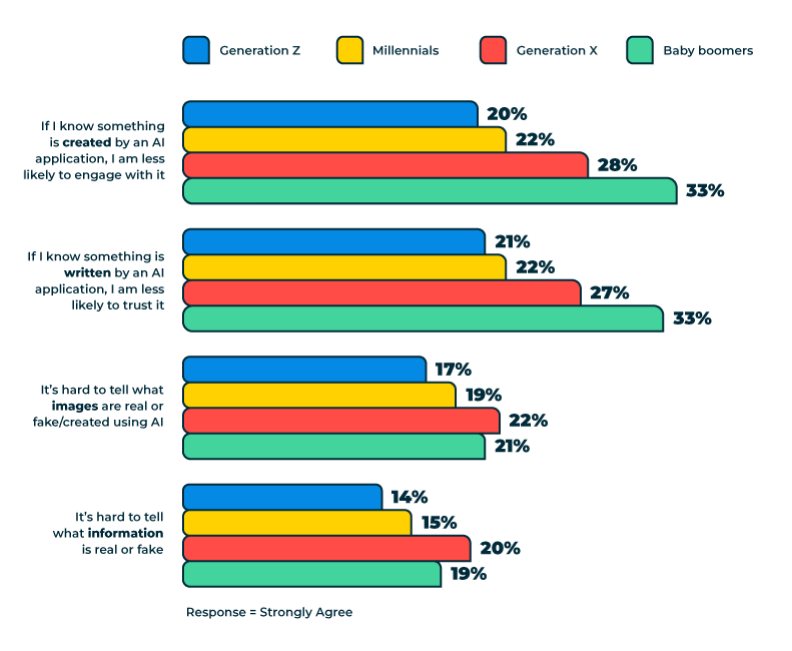
Sample: 4,420 respondents Source: Hootsuite Social Media Consumer 2024 Survey AI is inevitable on social, and scaling back on its use now would be like reverting from computers to typewriters. To thrive in this new environment, marketers and brands need to move beyond defining “real” and “authentic” based on whether something was created exclusively by a human. In 2024, the most successful brands will redefine “authenticity.” It’s not about who (or what) creates your content anymore; it’s about the brand experience your content creates for the customer. Does it feel right? Does it reinforce the brand? Does it work? Get those right and you can dismiss questions about whether a bot made it with a shrug.

How to work smarter with AI
Know your audience and how they feel about AI It’s timeless advice for a reason. A deep understanding of your audience can help you gather insights on whether factors such as age, culture, geography, or interests have influence on their perception of AI.
Decide which tasks to keep on your plate, and which to delegate AI makes a great assistant—but you still have to run the show. It’s up to you to delegate which aspects of the job AI can support, and which aspects need a more delicate hand (and nuanced brain, tbh).
Create AI policies and best practices for social media Make sure your team and organization are aligned in how you use AI. If you have rules and regulations in place, potential nightmares like angry customers and unapproved posts can be avoided.
Dig deeper into our AI data Get the full report →
Look into your industry’s future
Unveil new data and industry insights to skyrocket your social ROI in 2024.
01. Education Trends 02. Government Trends 03. Financial Services Trends 04. Healthcare Trends 05. Nonprofit Trends
Strategic brands commit to their champion social platforms
Be where your audience is, they said. But when your audience is everywhere, that’s a tall order—and the average social media user logs into about seven platforms each month. Seven. For brands, maintaining a presence on multiple networks is hard. In fact, it’s such a challenge for organizations, it’s emerged as the top ROI concern for social media.
Orgs fear the ROI impact of being on so many platforms
Which of the following issues do you think contribute to your organization’s concern about roi for social media activities.
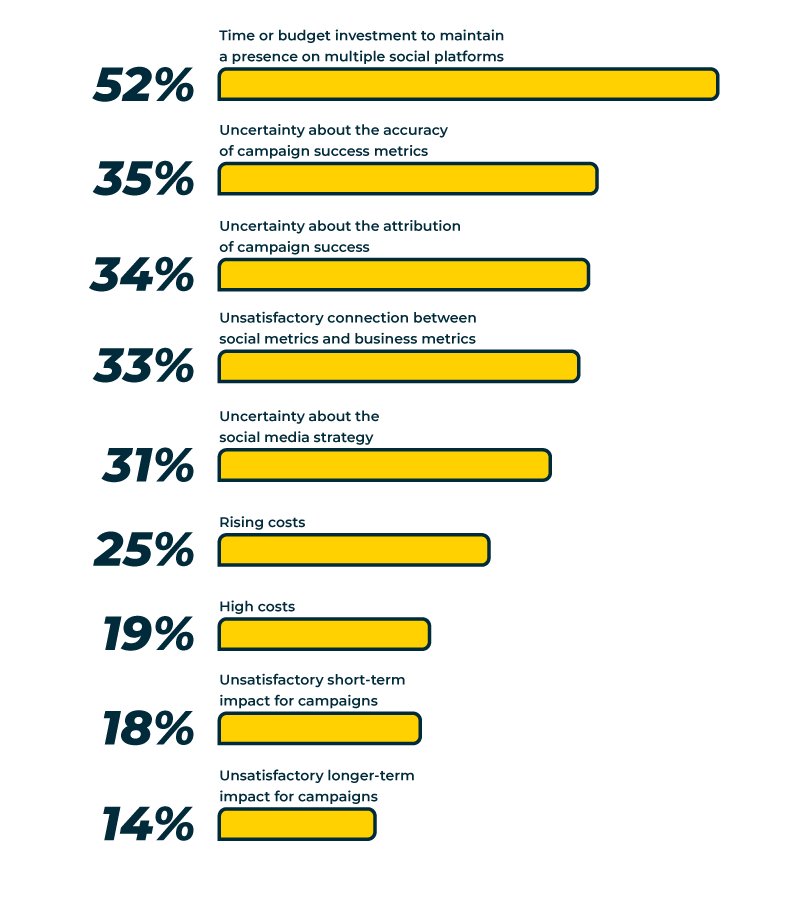
Today, instead of trying to do everything, everywhere, all at once, and letting time, money, resources, and results fall by the wayside (the historical norm), organizations are actually doing something about it—using ROI to figure out their next moves. Take Twitter/X, for example. The majority (60%) of organizations have a presence there, but only a third of them feel strongly that it benefits their business—which might explain the 7% drop in brand use. So organizations are more willing than even to say buh-bye to platforms and strategies that aren’t meeting their definition of ROI. They’re finally prioritizing their own platform-by-platform ROI scores and making business decisions accordingly.
No value, no point: Brands leave some of the social platform giants
Change in platform use for businesses from 2022 to 2023.
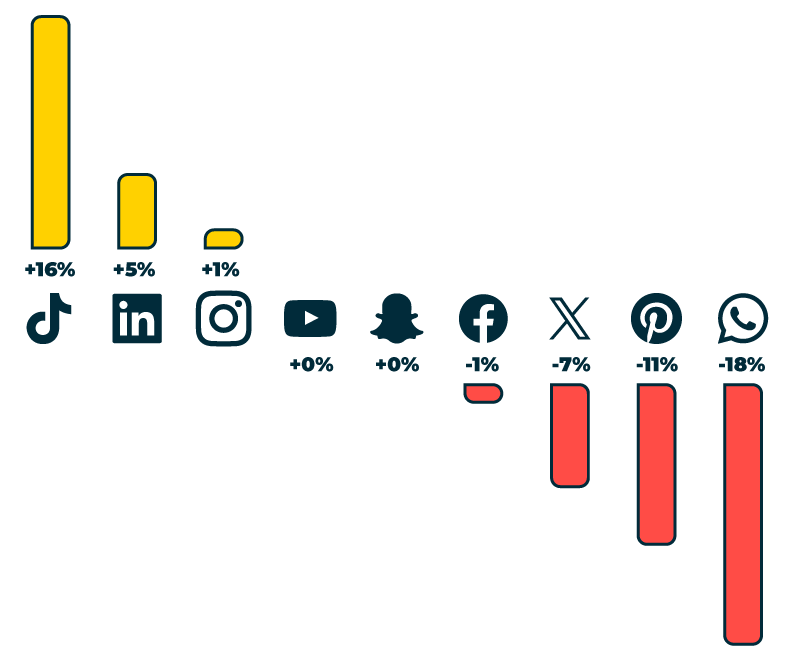
In 2024, strategic organizations will push back against unjustified expectations to be on every platform. They’ll unlock their top-performing channels based on ROI, and focus their attention on those—and only those. If they’re really confident (and brave), they might even abandon one or two altogether.
Because mastering a few key platforms is surely better than being so-so at many.
How to decode (and declutter) your social platform mix
Run a social media audit for platform intel This will help you identify your hero platforms—and your duds—so you can make informed decisions about how to approach your social strategy moving forward. Get started with our Social Media Audit Guide .
Put your platforms in an ROI showdown Calculate the ROI of every platform you use and weigh them against each other. Find a channel that’s lagging behind? Even if it generates a positive ROI, it may not be worth the investment if there’s greater potential for growth with your other platforms.
Master the art of (proper) cross-posting We don’t recommend the copy-and-paste method of cross-posting, but there are ways to do it right. The top rule is to align your content with the norms, best practices, and formats of each platform. Check out this strategy guide for some cross-posting pro tips.

Brands like yours are making bold moves on social
See how they do it, and find all the advice (and confidence) you need to follow suit.
Entertainment fuels the social ROI engine
Before you quit reading, we get it. Entertainment can be an intimidating word, especially if you work in a “serious” organization (let alone a regulated industry). Can you even connect entertainment to something quantifiable, like ROI? But consumers are saying it loud and clear. After staying in touch with family and friends, the top reason they use social media is to be entertained and to mentally unwind , according to our Social Trends 2024 Survey. You know what else they said? That they don’t like it when brands are too focused on self-promotion.
The problem is, brands seem to have other ideas: Almost half of marketers publish product or brand updates or news multiple times a week, according to our survey. That’s a huge disconnect between what brands are posting and what people really want to see. And it gets worse. While organizations are yammering about themselves, they also use engagement as the top metric to demonstrate ROI.
How can you demonstrate ROI through engagement metrics when you’re giving the audience exactly what they don’t want to engage with?
It’s no surprise then that over two-thirds of social marketers report being concerned about the ROI of their social activities. When brands measure success in ways that don’t add up, ROI will be hard to come by.
Brands cling to engagement to demonstrate ROI
Which metrics does your organization most commonly use to demonstrate the return on investment of its social activities.
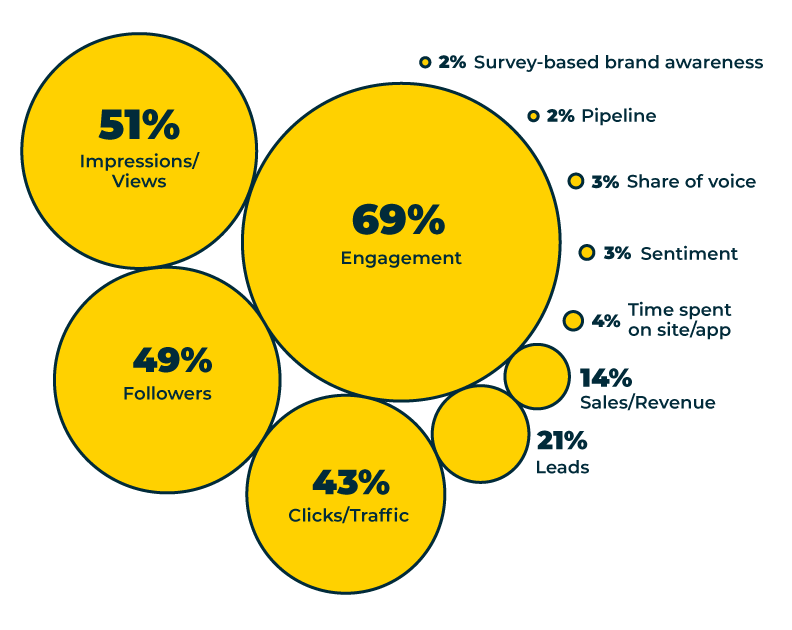
In 2024, brands that publish entertaining content on social will succeed in winning eyeballs, engagement, and (eventually) market share away from brands that keep on publishing the same old stuff.
You don’t need to overthink it either. “Entertainment” simply boils down to providing enjoyment, according to the Oxford English Dictionary—that could be finding inspiration, getting excited, feeling moved, or learning something new.
Be your relatable person-self, not your super-serious-brand-self. After all, social media is not a place where you talk at someone. It’s an interactive space where the exchange of value is a two-way street.
This isn’t a strategy you can pivot to overnight (obvs). But if your old, promotion-heavy strategy isn’t working as well as it used to, it’s time to get back to the true strength of social media: building brand awareness, affinity, and long-term relationships with your audience through engaging, entertaining social content.
How entertainment helps you win social
When it comes to content, follow your audience’s lead Don’t assume you know what your followers want to see. Grab the opportunity to ask them what they want through polls and Q&As. You can also run experiments with new content types or tone of voice. Once you see results, start tweaking future posts and keep testing and iterating as you go.
Let social be the long game Don’t rush into “smashing those goals.” Social is best for building brand equity, which takes time. Don’t revert to your old, self-promotion-y ways either. No one likes a hard sell, and letting them flock to you will be so much more effective in the long run.
Make social relationships the foundation of your ROI Measure how far engagements go beyond social and across your larger business goals. This gives your social media efforts a higher purpose and makes them rooted in customer value and authentic relationships.
New industry insights, unveiled
Education trends.
Learn how to make your strategy too cool for school
Government Trends
Lay down the law for your 2024 social strategy
Financial Services Trends
Read the report for a strategy you can bank on
Healthcare Trends
Give your 2024 social strategy a boost(er)
Nonprofit Trends
Build a social strategy that keeps on giving

Get more insights… or FOMO. It’s your call.
To read this content please select one of the options below:
Please note you do not have access to teaching notes, social media influencers: literature review, trends and research agenda.
Journal of Advances in Management Research
ISSN : 0972-7981
Article publication date: 21 December 2023
Issue publication date: 19 April 2024
This study aims to provide a holistic review of social media influencers (SMIs) research based on a unique approach of bibliometric analysis and content analysis between 2011 and 2020. The review examines the main influential aspects, themes and research streams to identify research directions for the future.
Design/methodology/approach
The sample selection and data collection were done from the Scopus database. The sample dataset was refined based on the inclusion and exclusion criteria to determine the final dataset of 183 articles. The dataset was exported in the BibTeX format and then imported into the BiblioShiny app for bibliometric analysis. The content analysis was done following the theory-context-methodology framework.
The several findings of this study include (1) Co-word analysis of most used keywords; (2) Longitudinal thematic evolution; (3) The focus of the research papers as per the theory-context-methodology review protocol are persuasion knowledge model, fashion and beauty industries, Instagram and content analysis, respectively; and (4) The network analysis of the research studies is known as the co-citation analysis and depicts the intellectual structure in the domain. This analysis resulted in four clusters of the research streams from the literature and two emergent themes (Chen et al., 2010)
Originality/value
In general, the previous reviews in the area are either domain, method or theory-based. Thus, this study aims to complement and extend the existing literature by presenting the overall picture of the SMI research with the help of a unique combined approach and further highlighting the trends and future research directions based on the findings of this study.
- Social media influencers
- Influencer marketing
- Social media
- Bibliometric analysis
- Literature review
Tanwar, A.S. , Chaudhry, H. and Srivastava, M.K. (2024), "Social media influencers: literature review, trends and research agenda", Journal of Advances in Management Research , Vol. 21 No. 2, pp. 173-202. https://doi.org/10.1108/JAMR-10-2022-0218
Emerald Publishing Limited
Copyright © 2023, Emerald Publishing Limited
Related articles
We’re listening — tell us what you think, something didn’t work….
Report bugs here
All feedback is valuable
Please share your general feedback
Join us on our journey
Platform update page.
Visit emeraldpublishing.com/platformupdate to discover the latest news and updates
Questions & More Information
Answers to the most commonly asked questions here
Numbers, Facts and Trends Shaping Your World
Read our research on:
Full Topic List
Regions & Countries
- Publications
- Our Methods
- Short Reads
- Tools & Resources
Read Our Research On:
- Teens, Social Media and Technology 2022
TikTok has established itself as one of the top online platforms for U.S. teens, while the share of teens who use Facebook has fallen sharply
Table of contents.
- Acknowledgments
- Methodology

Pew Research Center conducted this study to better understand teens’ use of digital devices, social media and other online platforms. For this analysis, we surveyed 1,316 U.S. teens. The survey was conducted online by Ipsos from April 14 to May 4, 2022.
This research was reviewed and approved by an external institutional review board (IRB), Advarra, which is an independent committee of experts that specializes in helping to protect the rights of research participants.
Ipsos recruited the teens via their parents who were a part of its KnowledgePanel , a probability-based web panel recruited primarily through national, random sampling of residential addresses. The survey is weighted to be representative of U.S. teens ages 13 to 17 who live with parents by age, gender, race, ethnicity, household income and other categories.
The trend data in this report comes from a Center survey on the same topic conducted from Sept. 25, 2014, to Oct. 9, 2014, and from Feb. 10, 2015, to March 16, 2015. The survey was fielded by the GfK Group on its KnowledgePanel, which was later acquired by Ipsos .
Here are the questions used for this report , along with responses, and its methodology .
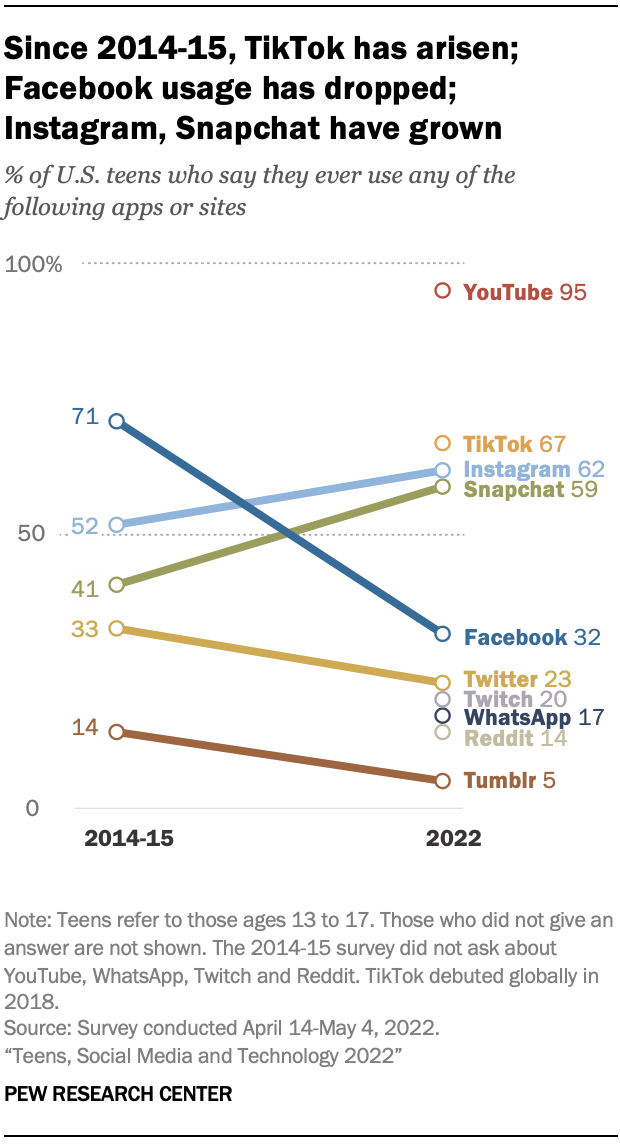
For the latest survey data on social media and tech use among teens, see “ Teens, Social Media, and Technology 2023 .”
The landscape of social media is ever-changing, especially among teens who often are on the leading edge of this space. A new Pew Research Center survey of American teenagers ages 13 to 17 finds TikTok has rocketed in popularity since its North American debut several years ago and now is a top social media platform for teens among the platforms covered in this survey. Some 67% of teens say they ever use TikTok, with 16% of all teens saying they use it almost constantly. Meanwhile, the share of teens who say they use Facebook, a dominant social media platform among teens in the Center’s 2014-15 survey , has plummeted from 71% then to 32% today.
YouTube tops the 2022 teen online landscape among the platforms covered in the Center’s new survey, as it is used by 95% of teens. TikTok is next on the list of platforms that were asked about in this survey (67%), followed by Instagram and Snapchat, which are both used by about six-in-ten teens. After those platforms come Facebook with 32% and smaller shares who use Twitter, Twitch, WhatsApp, Reddit and Tumblr. 1
Changes in the social media landscape since 2014-15 extend beyond TikTok’s rise and Facebook’s fall. Growing shares of teens say they are using Instagram and Snapchat since then. Conversely, Twitter and Tumblr saw declining shares of teens who report using their platforms. And two of the platforms the Center tracked in the earlier survey – Vine and Google+ – no longer exist.
There are some notable demographic differences in teens’ social media choices. For example, teen boys are more likely than teen girls to say they use YouTube, Twitch and Reddit, whereas teen girls are more likely than teen boys to use TikTok, Instagram and Snapchat. In addition, higher shares of Black and Hispanic teens report using TikTok, Instagram, Twitter and WhatsApp compared with White teens. 2
This study also explores the frequency with which teens are on each of the top five online platforms: YouTube, TikTok, Instagram, Snapchat and Facebook. Fully 35% of teens say they are using at least one of them “almost constantly.” Teen TikTok and Snapchat users are particularly engaged with these platforms, followed by teen YouTube users in close pursuit. A quarter of teens who use Snapchat or TikTok say they use these apps almost constantly, and a fifth of teen YouTube users say the same. When looking at teens overall, 19% say they use YouTube almost constantly, 16% say this about TikTok, and 15% about Snapchat.
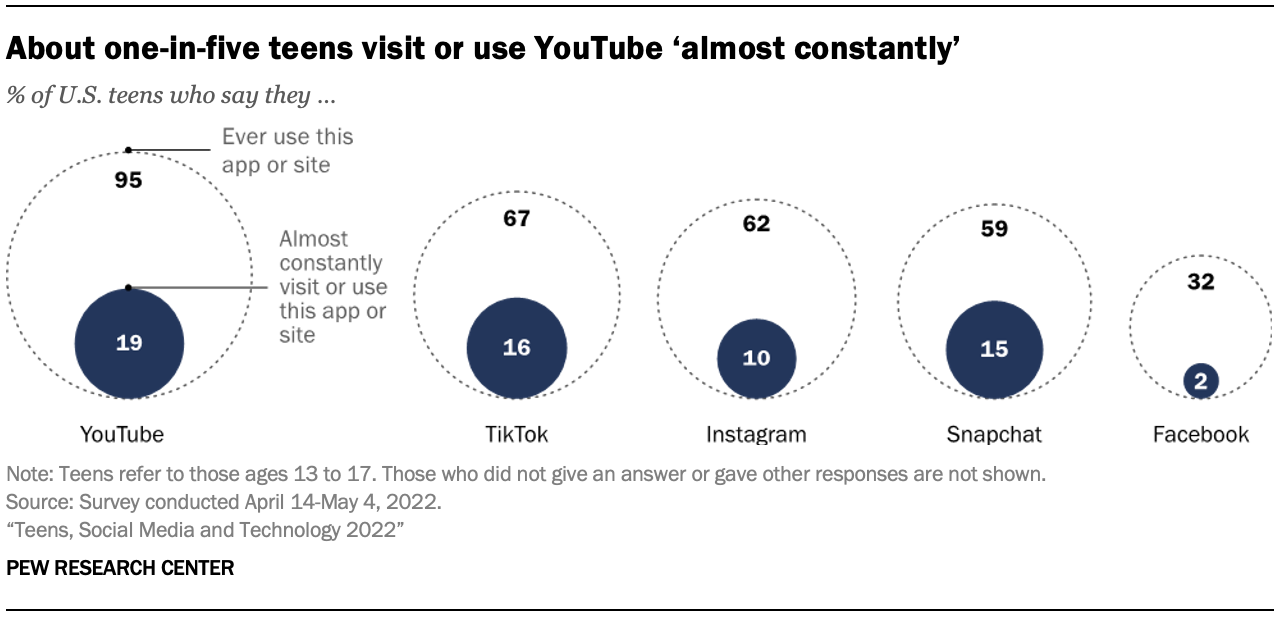
When reflecting on the amount of time they spend on social media generally, a majority of U.S. teens (55%) say they spend about the right amount of time on these apps and sites, while about a third of teens (36%) say they spend too much time on social media. Just 8% of teens think they spend too little time on these platforms.
Asked about the idea of giving up social media, 54% of teens say it would be at least somewhat hard to give it up, while 46% say it would be at least somewhat easy. Teen girls are more likely than teen boys to express it would be difficult to give up social media (58% vs. 49%). Conversely, a quarter of teen boys say giving up social media would be very easy, while 15% of teen girls say the same. Older teens also say they would have difficulty giving up social media. About six-in-ten teens ages 15 to 17 (58%) say giving up social media would be at least somewhat difficult to do. A smaller share of 13- to 14-year-olds (48%) think this would be difficult.
Beyond just online platforms, the new survey finds that the vast majority of teens have access to digital devices, such as smartphones (95%), desktop or laptop computers (90%) and gaming consoles (80%). And the study shows there has been an uptick in daily teen internet users, from 92% in 2014-15 to 97% today. In addition, the share of teens who say they are online almost constantly has roughly doubled since 2014-15 (46% now and 24% then).
These are some of the findings from an online survey of 1,316 teens conducted by the Pew Research Center from April 14 to May 4, 2022. More details about the findings on adoption and use of digital technologies by teens are covered below.
Smartphones, desktop and laptop computers, and gaming consoles remain widely accessible to teens
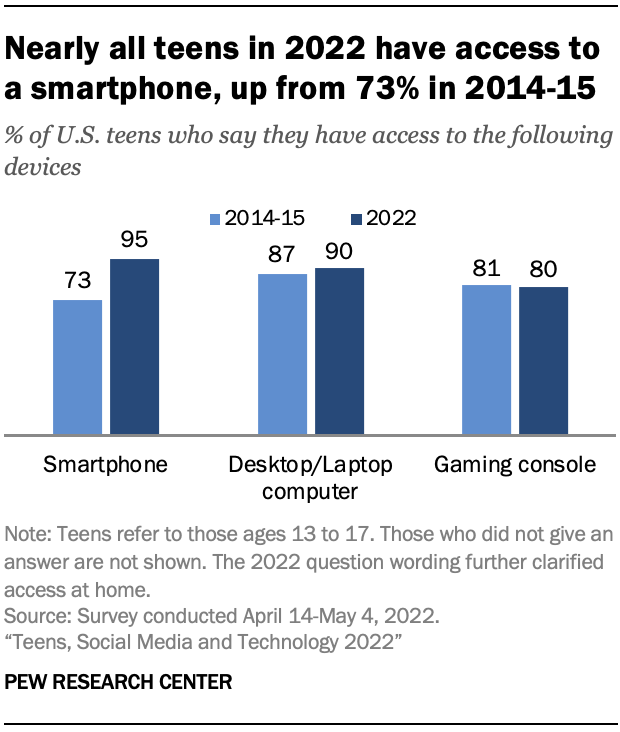
Since 2014-15, there has been a 22 percentage point rise in the share of teens who report having access to a smartphone (95% now and 73% then). While teens’ access to smartphones has increased over roughly the past eight years, their access to other digital technologies, such as desktop or laptop computers or gaming consoles, has remained statistically unchanged.
The survey shows there are differences in access to these digital devices for certain groups. For instance, teens ages 15 to 17 (98%) are more likely to have access to a smartphone than their 13- to 14-year-old counterparts (91%). In addition, teen boys are 21 points more likely to say they have access to gaming consoles than teen girls – a pattern that has been reported in prior Center research . 3
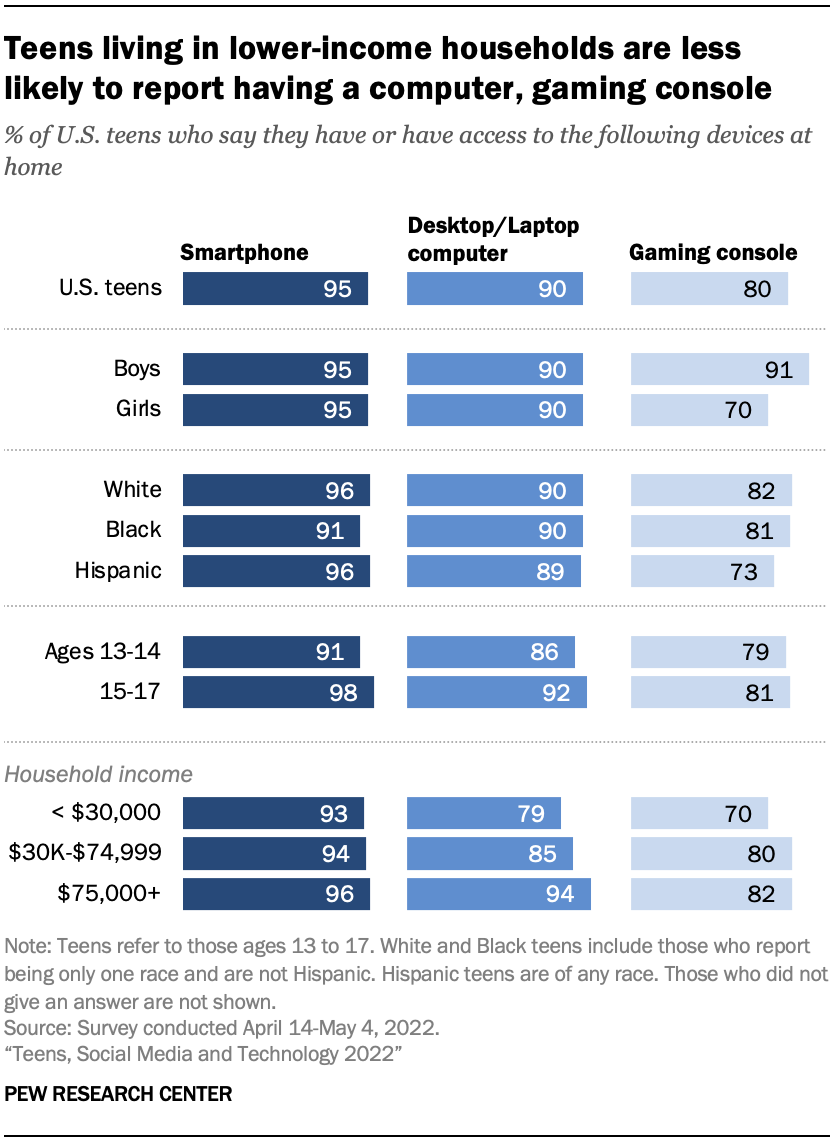
Access to computers and gaming consoles also differs by teens’ household income. U.S. teens living in households that make $75,000 or more annually are 12 points more likely to have access to gaming consoles and 15 points more likely to have access to a desktop or laptop computer than teens from households with incomes under $30,000. These gaps in teen computer and gaming console access are consistent with digital divides by household income the Center has observed in previous teen surveys.
While 72% of U.S. teens say they have access to a smartphone, a computer and a gaming console at home, more affluent teens are particularly likely to have access to all three devices. Fully 76% of teens that live in households that make at least $75,000 a year say they have or have access to a smartphone, a gaming console and a desktop or laptop computer, compared with smaller shares of teens from households that make less than $30,000 or teens from households making $30,000 to $74,999 a year who say they have access to all three (60% and 69% of teens, respectively).
Almost all U.S. teens report using the internet daily
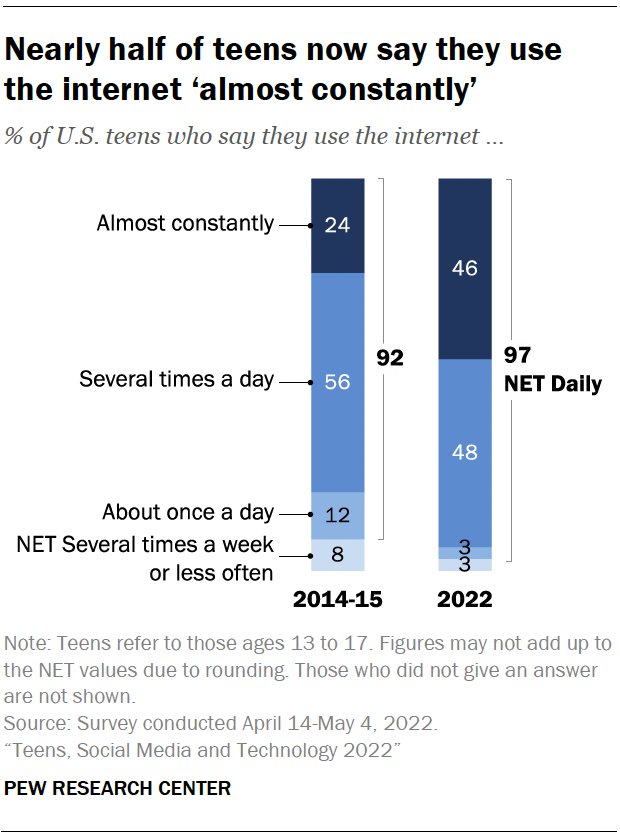
The share of teens who say they use the internet about once a day or more has grown slightly since 2014-15. Today, 97% of teens say they use the internet daily, compared with 92% of teens in 2014-15 who said the same.
In addition, the share of teens who say they use the internet almost constantly has gone up: 46% of teens say they use the internet almost constantly, up from only about a quarter (24%) of teenagers who said the same in 2014-15.
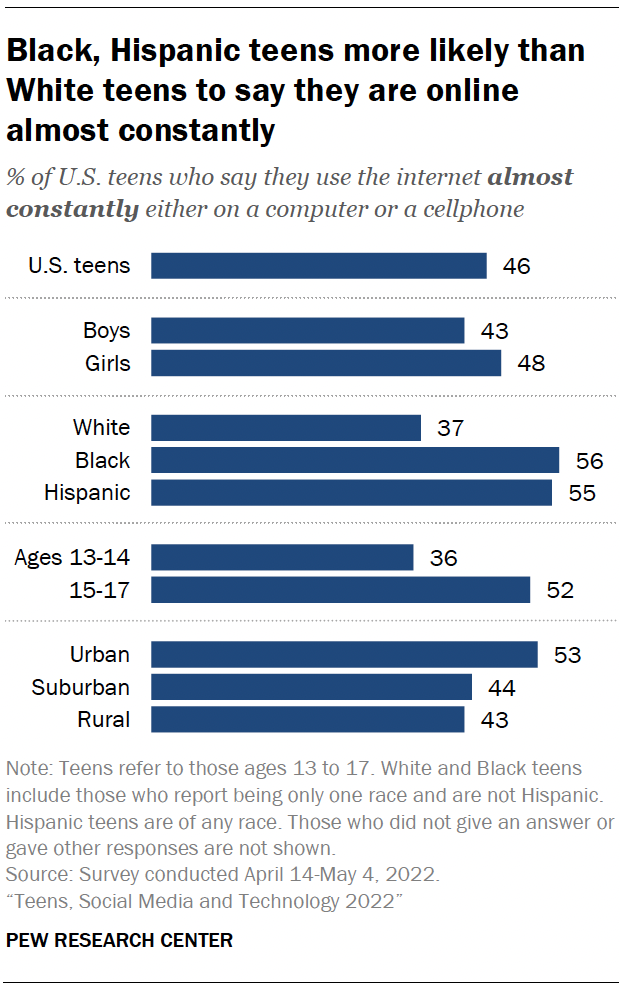
Black and Hispanic teens stand out for being on the internet more frequently than White teens. Some 56% of Black teens and 55% of Hispanic teens say they are online almost constantly, compared with 37% of White teens. The difference between Hispanic and White teens on this measure is consistent with previous findings when it comes to frequent internet use .
In addition, older teens are more likely to be online almost constantly. Some 52% of 15- to 17-year-olds say they use the internet almost constantly, while 36% of 13- to 14-year-olds say the same. Another demographic pattern in “almost constant” internet use: 53% of urban teens report being online almost constantly, while somewhat smaller shares of suburban and rural teens say the same (44% and 43%, respectively).
Slight differences are seen among those who say they engage in “almost constant” internet use based on household income. A slightly larger share of teens from households making $30,000 to $74,999 annually report using the internet almost constantly, compared with teens from homes making at least $75,000 (51% and 43%, respectively). Teens who live in households making under $30,000 do not significantly differ from either group.
The social media landscape has shifted
This survey asked whether U.S. teens use 10 specific online platforms: YouTube, TikTok, Instagram, Snapchat, Facebook, Twitter, Twitch, WhatsApp, Reddit and Tumblr.
YouTube stands out as the most common online platform teens use out of the platforms measured, with 95% saying they ever use this site or app. Majorities also say they use TikTok (67%), Instagram (62%) and Snapchat (59%). Instagram and Snapchat use has grown since asked about in 2014-15, when roughly half of teens said they used Instagram (52%) and about four-in-ten said they used Snapchat (41%).
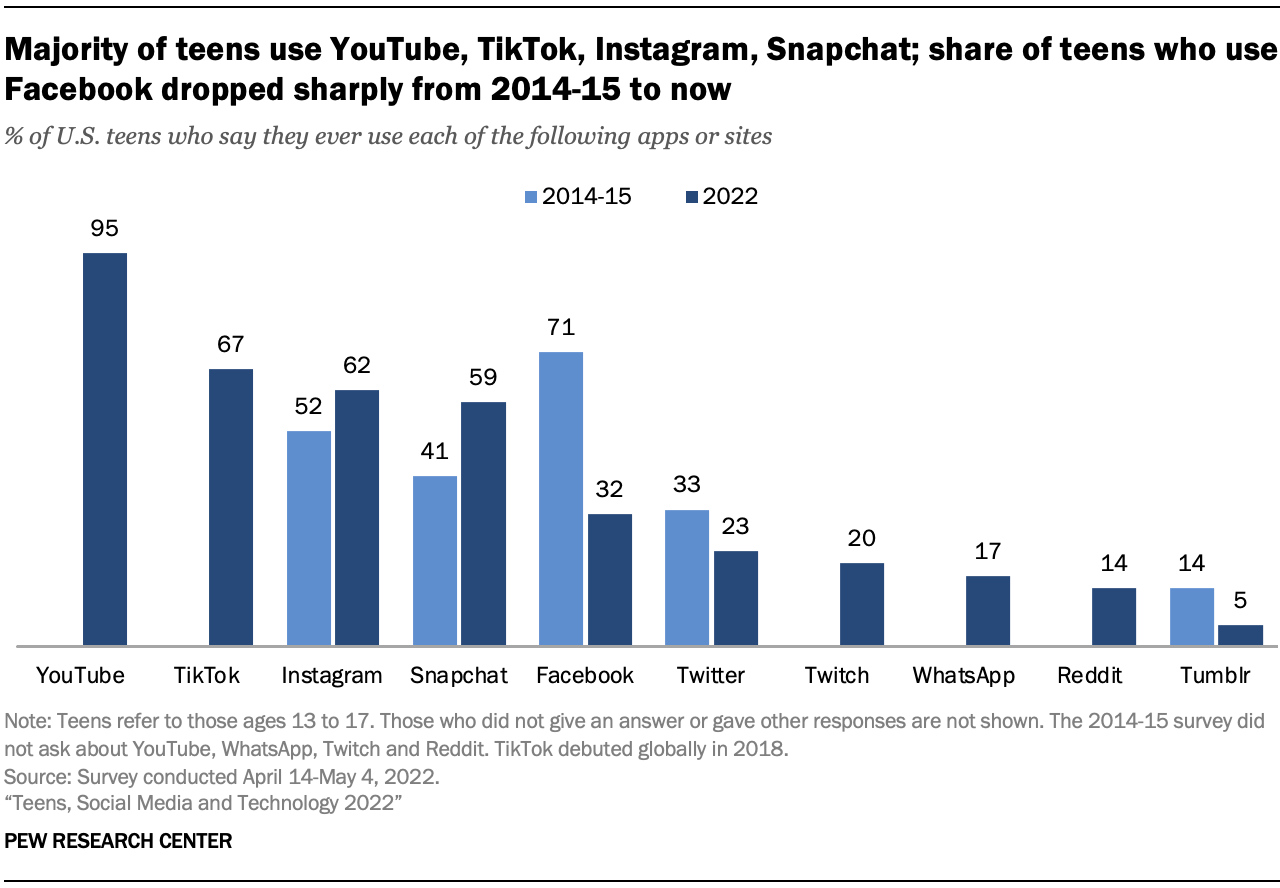
The share of teens using Facebook has declined sharply in the past decade. Today, 32% of teens report ever using Facebook, down 39 points since 2014-15, when 71% said they ever used the platform. Although today’s teens do not use Facebook as extensively as teens in previous years, the platform still enjoys widespread usage among adults, as seen in other recent Center studies .
Other social media platforms have also seen decreases in usage among teens since 2014-15. Some 23% of teens now say they ever use Twitter, compared with 33% in 2014-15. Tumblr has seen a similar decline. While 14% of teens in 2014-15 reported using Tumblr, just 5% of teens today say they use this platform.
The online platforms teens flock to differ slightly based on gender. Teen girls are more likely than teen boys to say they ever use TikTok, Instagram and Snapchat, while boys are more likely to use Twitch and Reddit. Boys also report using YouTube at higher rates than girls, although the vast majority of teens use this platform regardless of gender.
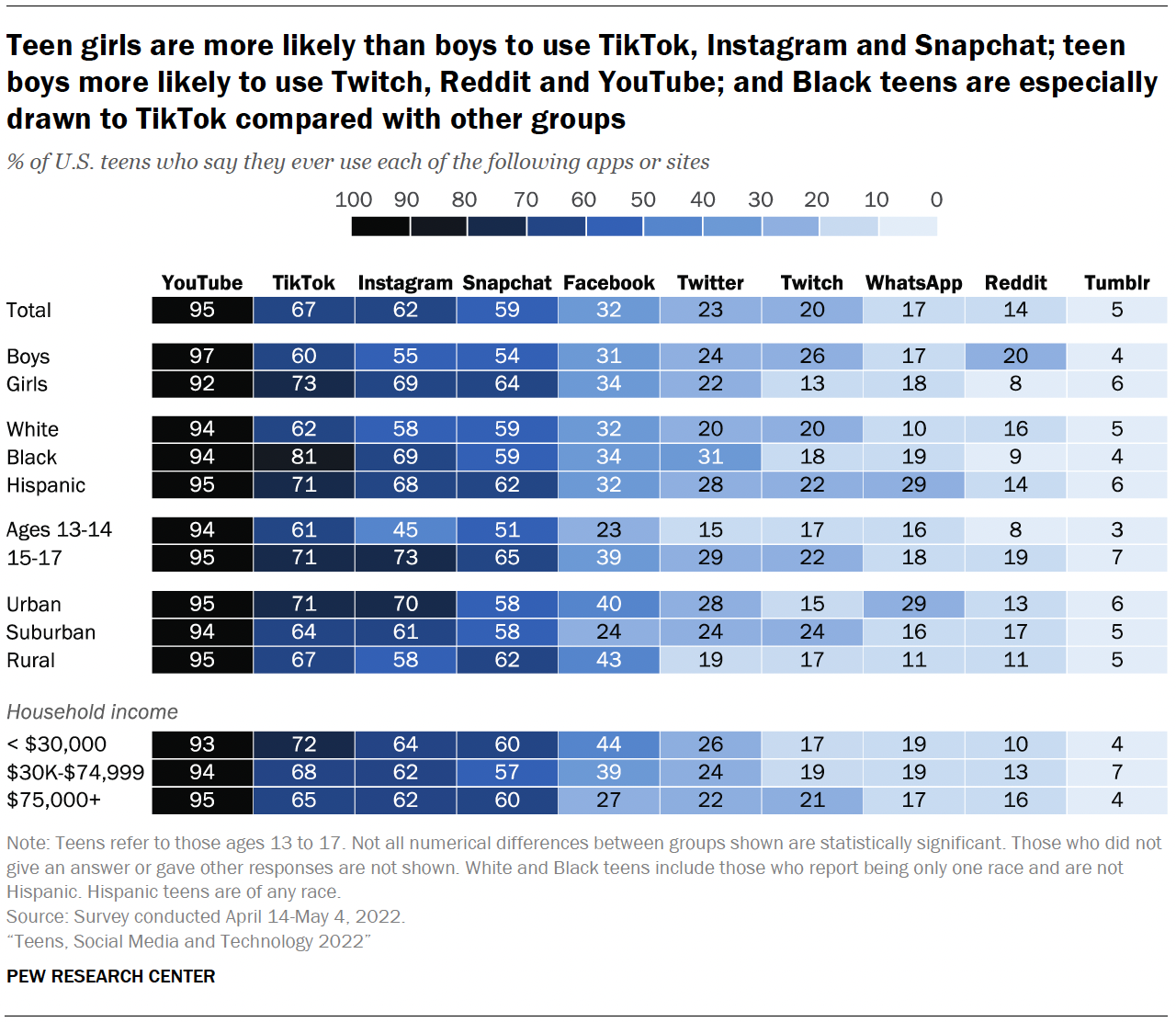
Teens’ use of certain online platforms also differs by race and ethnicity. Black and Hispanic teens are more likely than White teens to say they ever use TikTok, Instagram, Twitter or WhatsApp. Black teens also stand out for being more likely to use TikTok compared with Hispanic teens, while Hispanic teens are more likely than their peers to use WhatsApp.
Older teens are more likely than younger teens to say they use each of the online platforms asked about except for YouTube and WhatsApp. Instagram is an especially notable example, with a majority of teens ages 15 to 17 (73%) saying they ever use Instagram, compared with 45% of teens ages 13 to 14 who say the same (a 28-point gap).
Despite Facebook losing its dominance in the social media world with this new cohort of teens, higher shares of those living in lower- and middle-income households gravitate toward Facebook than their peers who live in more affluent households: 44% of teens living in households earning less than $30,000 a year and 39% of teens from households earning $30,000 to less than $75,000 a year say they ever use Facebook, while 27% of those from households earning $75,000 or more a year say the same. Differences in Facebook use by household income were found in previous Center surveys as well (however the differences by household income were more pronounced in the past).
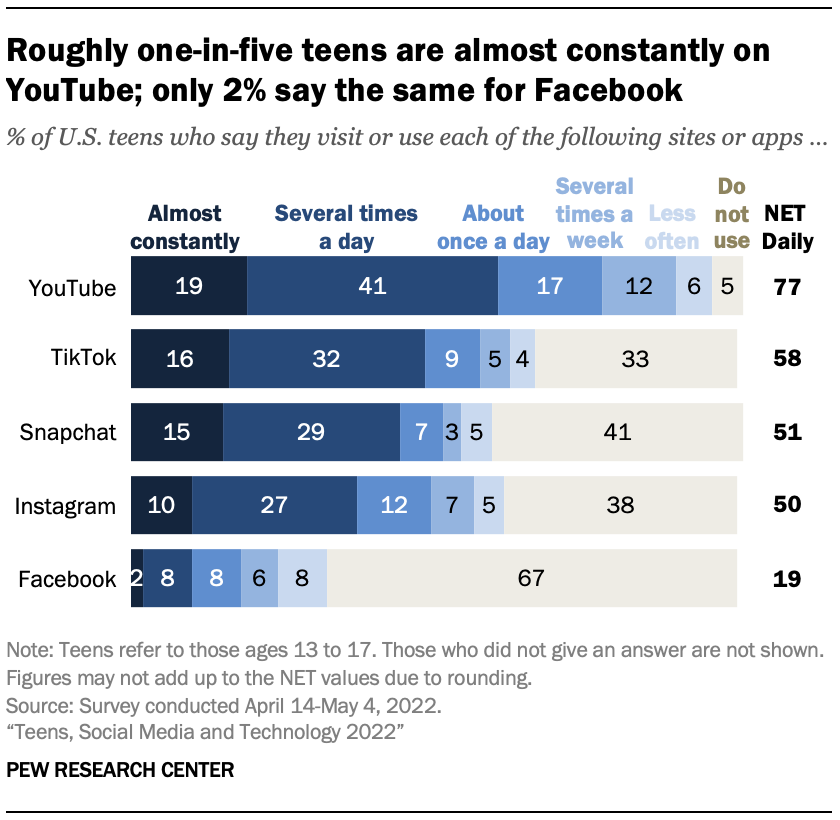
When it comes to the frequency that teens use the top five platforms the survey looked at, YouTube and TikTok stand out as the platforms teens use most frequently. About three-quarters of teens visit YouTube at least daily, including 19% who report using the site or app almost constantly. A majority of teens (58%) visit TikTok daily, while about half say the same for Snapchat (51%) and Instagram (50%).
Looking within teens who use a given platform, TikTok and Snapchat stand out for having larger shares of teenage users who visit these platforms regularly. Fully 86% of teen TikTok or Snapchat users say they are on that platform daily and a quarter of teen users for both of these platforms say they are on the site or app almost constantly. Somewhat smaller shares of teen YouTube users (20%) and teen Instagram users (16%) say they are on those respective platforms almost constantly (about eight-in-ten teen users are on these platforms daily).
Not only is there a smaller share of teenage Facebook users than there was in 2014-15, teens who do use Facebook are also relatively less frequent users of the platform compared with the other platforms covered in this survey. Just 7% of teen Facebook users say they are on the site or app almost constantly (representing 2% of all teens). Still, about six-in-ten teen Facebook users (57%) visit the platform daily.
Across these five platforms, 35% of all U.S. teens say they are on at least one of them almost constantly. While this is not a comprehensive rundown of all teens who use any kind of online platform almost constantly, this 35% of teens represent a group of relatively heavy platform users and they clearly have different views about their use of social media compared with those who say they use at least one of these platforms, though less often than “almost constantly.” Those findings are covered in a later section.
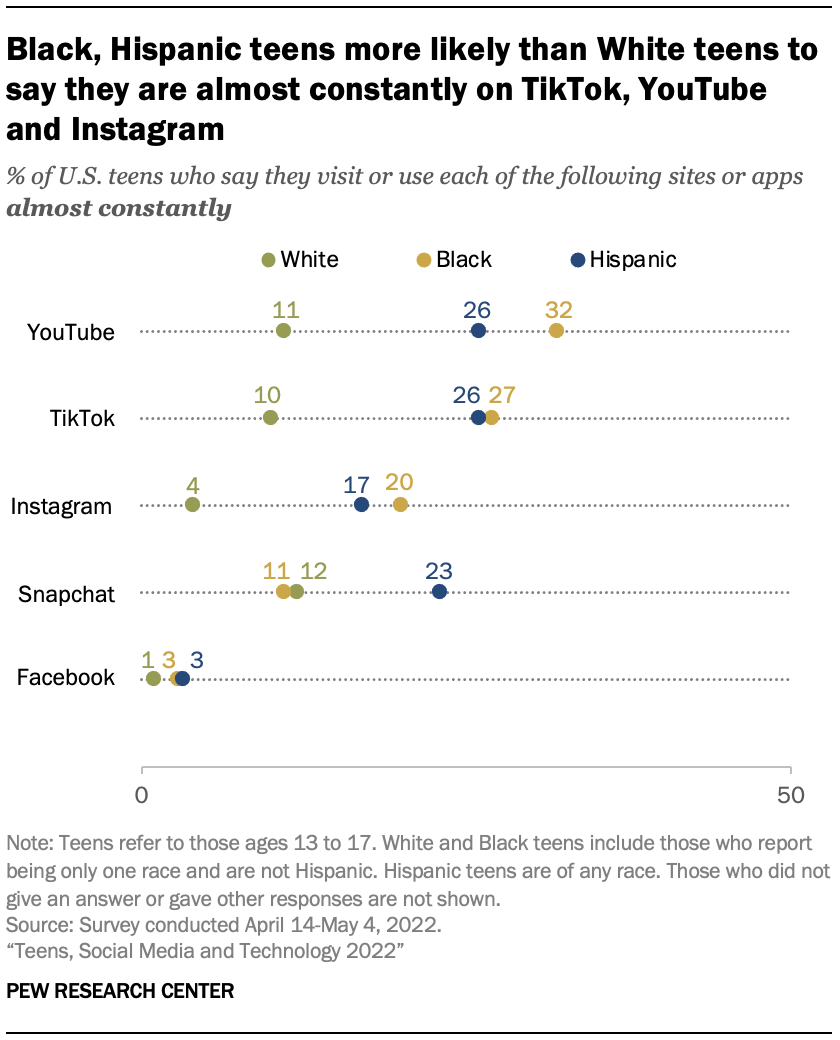
Larger shares of Black and Hispanic teens say they are on TikTok, YouTube and Instagram almost constantly than White teens. For example, Black and Hispanic teens are roughly five times more likely than White teens to say they are on Instagram almost constantly.
Hispanic teens are more likely to be frequent users of Snapchat than White or Black teens: 23% of Hispanic teens say they use this social media platform almost constantly, while 12% of White teens and 11% of Black teens say the same. There are no racial and ethnic differences in teens’ frequency of Facebook usage.
Overall, Hispanic (47%) and Black teens (45%) are more likely than White teens (26%) to say they use at least one of these five online platforms almost constantly.
Slight majorities of teens see the amount of time they spend on social media as about right and say it would be hard to give up
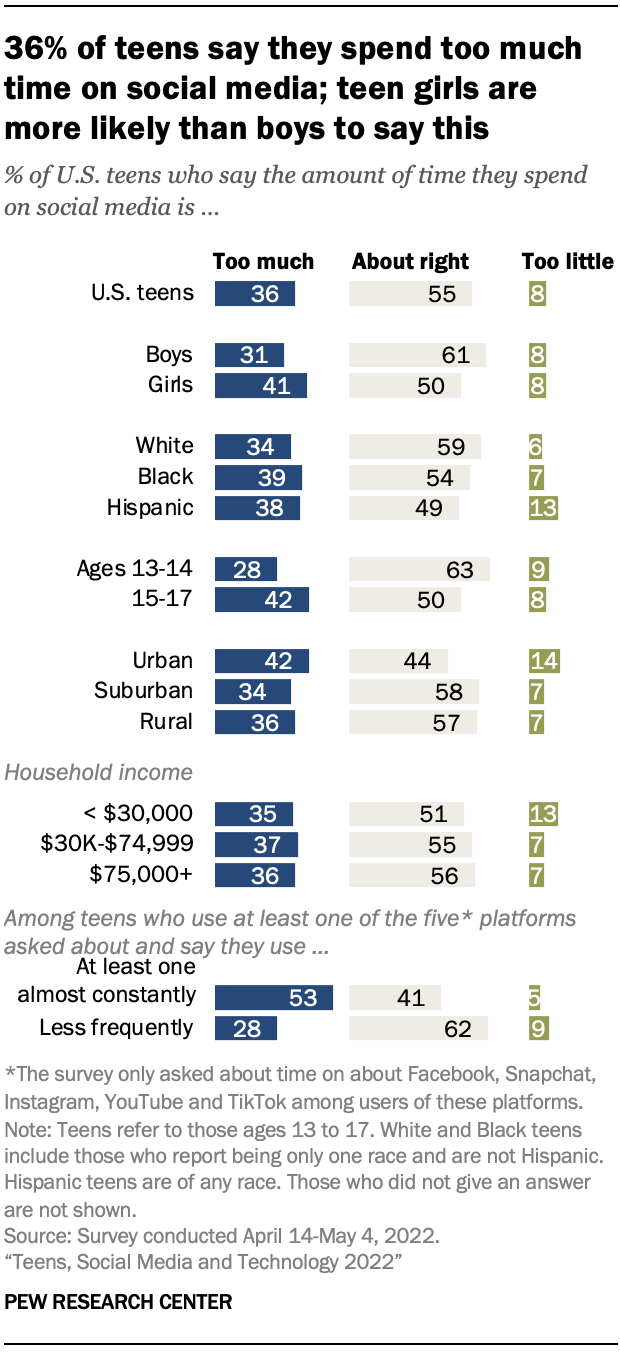
As social media use has become a common part of many teens’ daily routine, the Center asked U.S. teens how they feel about the amount of time they are spending on social media. A slight majority (55%) say the amount of time they spend of social media is about right, and smaller shares say they spend too much time or too little time on these platforms.
While a majority of teen boys and half of teen girls say they spend about the right amount of time on social media, this sentiment is more common among boys. Teen girls are more likely than their male counterparts to say they spend too much time on social media. In addition, White teens are more likely to see their time using social media as about right compared with Hispanic teens. Black teens do not differ from either group.
This analysis also explored how teens who frequently use these platforms may feel about their time on them and how those feelings may differ from teens who use these sites and apps less frequently. To do this, two groups were constructed. The first group is the 35% of teens who say they use at least one of the five platforms this survey covered – YouTube, TikTok, Instagram, Snapchat or Facebook – almost constantly. The other group consists of teens who say they use these platforms but not as frequently – that is, they use at least one of these five platforms but use them less often than “almost constantly.”
When asked how they feel about the time they spend on social media, 53% of teens who almost constantly use at least one of the platforms say they are on social media too much, while about three-in-ten teens (28%) who use at least one of these platforms but less often say the same.
Teens who are almost constantly online – not just on social media – also stand out for saying they spend too much time on social media: 51% say they are on social media too much. By comparison, 26% of teens who are online several times a day say they are on social media too much.
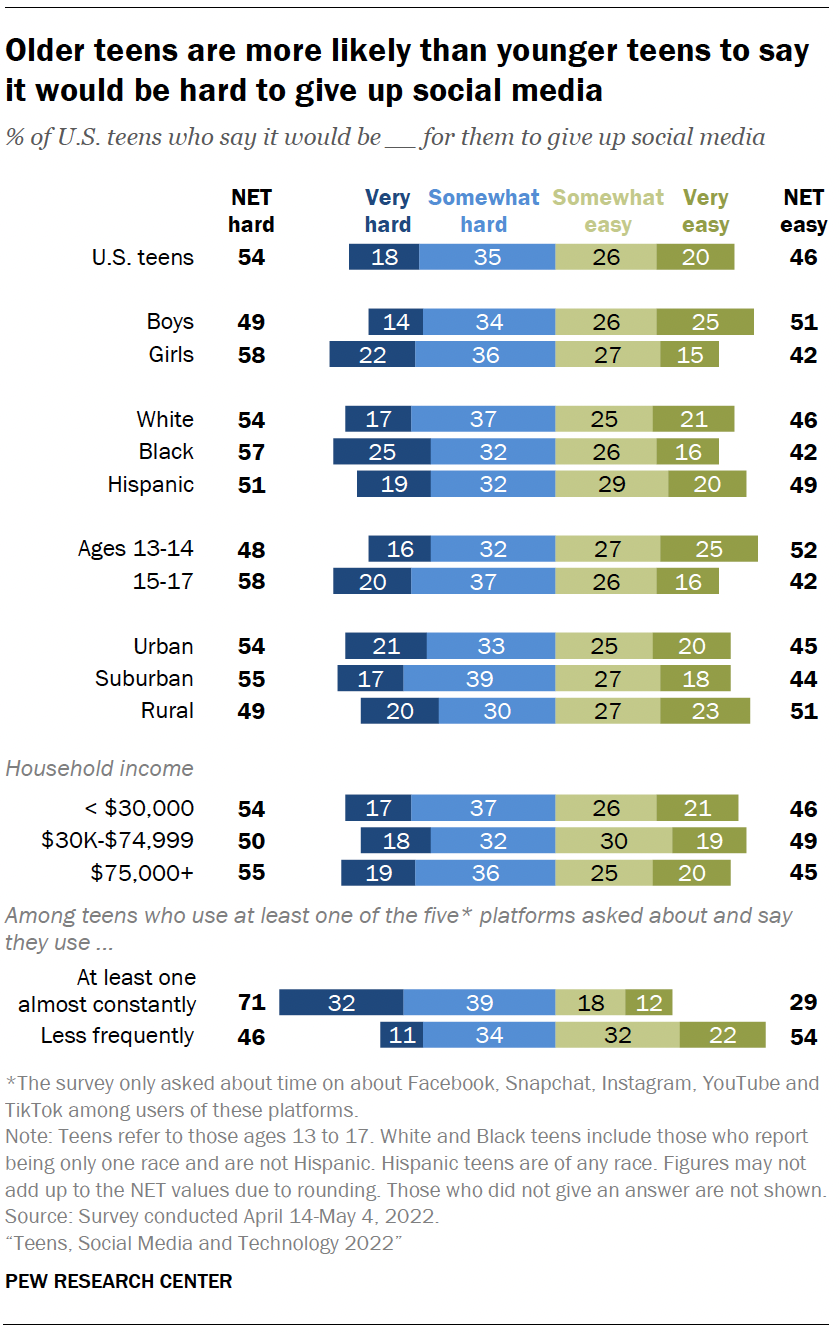
When reflecting on what it would be like to try to quit social media, teens are somewhat divided whether this would be easy or difficult. Some 54% of U.S. teens say it would be very (18%) or somewhat hard (35%) for them to give up social media. Conversely, 46% of teens say it would be at least somewhat easy for them to give up social media, with a fifth saying it would be very easy.
Teenage girls are slightly more likely to say it would be hard to give up social media than teen boys (58% vs. 49%). A similar gap is seen between older and younger teens, with teens 15 to 17 years old being more likely than 13- and 14-year-olds to say it would be at least somewhat hard to give up social media.
A majority of teens who use at least one of the platforms asked about in the survey “almost constantly” say it would be hard to give up social media, with 32% saying it would be very hard. Smaller shares of teens who use at least one of these online platforms but use them less often say the same.
The teens who think they spend too much time on social media also report they would struggle to step back completely from it. Teens who say they spend too much time on social media are 36 percentage points more likely than teens who see their usage as about right to say giving up social media would be hard (78% vs. 42%). In fact, about three-in-ten teens who say they use social media too much (29%) say it would be very hard for them to give up social media. Conversely, a majority of teens who see their social media usage as about right (58%) say that it would be at least somewhat easy for them to give it up.
- A 2018 Center survey also asked U.S. teens about their technology adoption and usage. Direct comparisons cannot be made across the two surveys due to differences in the ways the surveys were conducted. ↩
- There were not enough Asian American respondents in the sample to be broken out into a separate analysis. As always, their responses are incorporated into the general population figures throughout the report. ↩
- A 2018 Center survey also asked U.S teens about their video gaming habits. Direct comparisons cannot be made across the two surveys due to differences in the ways the surveys were conducted. Still, there are common patterns between the two separate surveys; for example, teen boys were more likely to report access to a gaming console or that they play video games than teen girls. ↩
Sign up for our weekly newsletter
Fresh data delivery Saturday mornings
Sign up for The Briefing
Weekly updates on the world of news & information
- Social Media
- Teens & Tech
- Teens & Youth
Social Media Fact Sheet
Teens and social media fact sheet, more americans are getting news on tiktok, bucking the trend seen on most other social media sites, how americans view data privacy, life on social media platforms, in users’ own words, most popular, report materials.
1615 L St. NW, Suite 800 Washington, DC 20036 USA (+1) 202-419-4300 | Main (+1) 202-857-8562 | Fax (+1) 202-419-4372 | Media Inquiries
Research Topics
- Email Newsletters
ABOUT PEW RESEARCH CENTER Pew Research Center is a nonpartisan fact tank that informs the public about the issues, attitudes and trends shaping the world. It conducts public opinion polling, demographic research, media content analysis and other empirical social science research. Pew Research Center does not take policy positions. It is a subsidiary of The Pew Charitable Trusts .
© 2024 Pew Research Center

IMAGES
VIDEO
COMMENTS
Discover the latest trends in 234 social media research topics, exploring the impact on society, online behavior, and digital interactions.
Social media research is a rapidly growing field that encompasses a wide range of topics, from understanding the psychological and social effects of social media to analyzing patterns of user behavior and identifying trends in online conversations.
Social Media Trends 2024. Updated May 2nd, 2024. The chase for ROI continues in 2024—but brands that lean into AI, entertainment, and their top-performing platforms close in on winning social media strategies. Get the full report.
Tripti Singh. Motilal Nehru National Institute of Technology. Subiya Rahman. Citations (11) References (75) Figures (9) Abstract and Figures. Social media is emerging as an essential media for...
This paper brings into vision the research structure of social media in terms of topics, temporal topic evolutions, topic trends, emerging, fading, and consistent topics of this domain. It also traces various shifts in topic themes.
This paper aims at making a trend analysis of 1142 studies in the field of social media that were published in 12 SSCI journals from 2012 to 2016. Citation and content analyses were used to...
The several findings of this study include (1) Co-word analysis of most used keywords; (2) Longitudinal thematic evolution; (3) The focus of the research papers as per the theory-context-methodology review protocol are persuasion knowledge model, fashion and beauty industries, Instagram and content analysis, respectively; and (4) The network ana...
The landscape of social media is ever-changing, especially among teens who often are on the leading edge of this space. A new survey of American teenagers ages 13 to 17 finds that TikTok has established itself as one of the top online platforms for U.S. teens, while the share of teens who use Facebook has fallen sharply.
Social media plays a vital role in implementing more sustainable operational practices across an organization in that it raises greater awareness of sustainability, enables stake- holders to participate more effectively, and has become an important source of information for business.
What new ideas have emerged among the two highly trending research topics of sustainability and social media? In this study, we present an empirical analysis of 762 published works that...